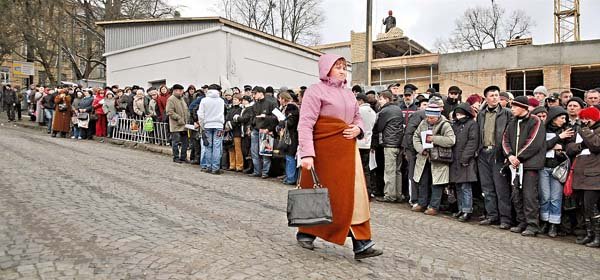As a journalist working at EurActiv, a private and independent media company specializing in European Union affairs, I was honored by the Kyiv Post’s invitation to submit a commentary about Ukrainian President Viktor Yanukovich’s visit to Brussels.
Several years ago, when I was still working for a daily newspaper in my home country of Bulgaria, we were equally interested in getting outside perspectives at key points in the country’s relations with the EU and the West in general. So I am happy to return a favor that has been afforded to me in the past.
First of all, I would like Ukraine to become part of the European Union one day, because the country is genuinely European and its accession to the EU is of mutual interest. The question is, what will the EU look like on that day? I hope that the EU will remain attractive. As the Russians say, we will live and we will see.
When Yanukovich arrived in Brussels on Nov. 22, the West was expressing the same kind of doubts as it had done with regard to my country in 1995-1996 under the Socialist government of Zhan Videnov. In both cases, the West was not sure if the countries’ political elite preferred the West or Russia, and it needed assurances that if Western countries invested there, their effort would not be wasted.
However, there are some differences. In Bulgaria, governments used to be weak and never lasted long. Besides, in 1999, the Socialists, in opposition at that time, abandoned their hostility toward NATO and basically aligned with the West on all foreign policy issues. This was certainly an important milestone.
Also, when Bulgaria was being scrutinized in the same way as Ukraine is today, Russia was a very weak country under Boris Yeltsin. Today’s Russia is much stronger and harbors ambitions to restore as much as possible of the global political weight it enjoyed in Soviet times.
From a Brussels perspective, Ukraine is not seen as going “back to the USSR.”It is obvious that this is not in the interest of the country’s political elite. Ukraine is instead seen as an empire, smaller that Russia indeed, under deep transformation, with the big question being – in which direction?

People stand in line outisde the Polish consulate in Lviv. (PHL)
Kyiv’s propaganda usually suggests that the EU should take advantage of a stable, orderly and predictable Ukraine, in contrast with the messy political atmosphere under Viktor Yushchenko and Yulia Tymoshenko. But some circles in the EU suspect Yanukovich of putting in place an authoritarian regime that is incompatible with EU values.
As I write these lines, I learn that thousands of people are rallying against the administration in Kyiv and numerous reports suggest that demonstrators who tried to reach the capital on buses from other cities have been prevented from coming.
EU officials have identified issues of concern, particularly following the Oct. 31 local elections, which were seen as a “step backwards” compared to the standard of the presidential elections held previously.
An EU diplomat called the recent constitutional amendments, largely portrayed in the Western press as a power grab by Yanukovych, as “an unprecedented step of overturning the reforms” made six years ago.
This, of course, confirms fears expressed in the European Parliament, especially by its largest group, the center-right European People’s Party, in a draft resolution which Ukrainian diplomats have been trying hard to water down.
The carefully-worded joint communique, which as a rule is the result of yet another diplomatic tug of war, comprises parts which give satisfaction to those who want to express concern over democratic standards in Ukraine. Equally, it contains elements which were hailed in Ukraine, such as visa liberalization.
In fact, on that topic, diplomats produced the strangest sentence, promising “a long-term perspective for short-stay travel for Ukrainian citizens.”
As a national from the first country to successfully get itself deleted from the Schengen negative list, I remember that the EU’s decision to open its borders to Bulgarians in April 2001 was considered by my compatriots as a bigger event than the country’s EU accession, which took place in January 2007.
I also think that, thanks to freedom to travel for a period of up to three months, many Bulgarians benefited personally from their contacts with the EU, probably more so than the country benefited from EU accession itself.
Therefore I’m perfectly aware of the political capital to be won by a government capable of finding a solution to the problem.
I recently spoke to EU diplomats who insisted that Ukraine’s visa liberalization process would be “different” from the one recently agreed with Western Balkan countries. In the case of Kyiv, the visa requirement could only be effectively lifted in the long term, the officials insisted.
For the EU, it is increasingly difficult to deal with visa liberalization requests, which come from all sides, including Turkey and Russia, to name but two. I assume that in the case of Ukraine, visa liberalization must also progress alongside advances on human rights and democratic standards.
I can read Russian and I understand Ukrainian. So I can see that Yanukovych is presenting visa liberalization to his people as an historic breakthrough. He is also apparently neglecting to notice concerns about recent local elections, constitutional reform and democratic standards expressed by his Brussels hosts, European Council President Herman Van Rompuy and European Commission President Jos? Manuel Barroso.
Indeed, Yanukovych succeeded in securing a sentence on visa liberalization which he could claim was never given to his predecessor. But he should know that Ukrainians are going to judge him by his capacity to advance down this path. And this is not a small challenge.
Georgi Gotev is senior editor of EurActiv.com and can be reached at [email protected]
